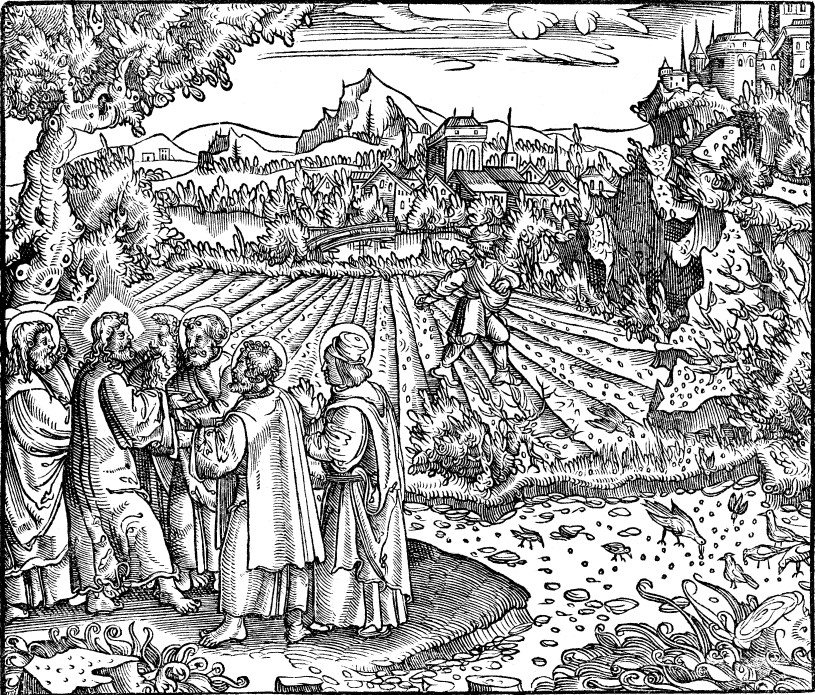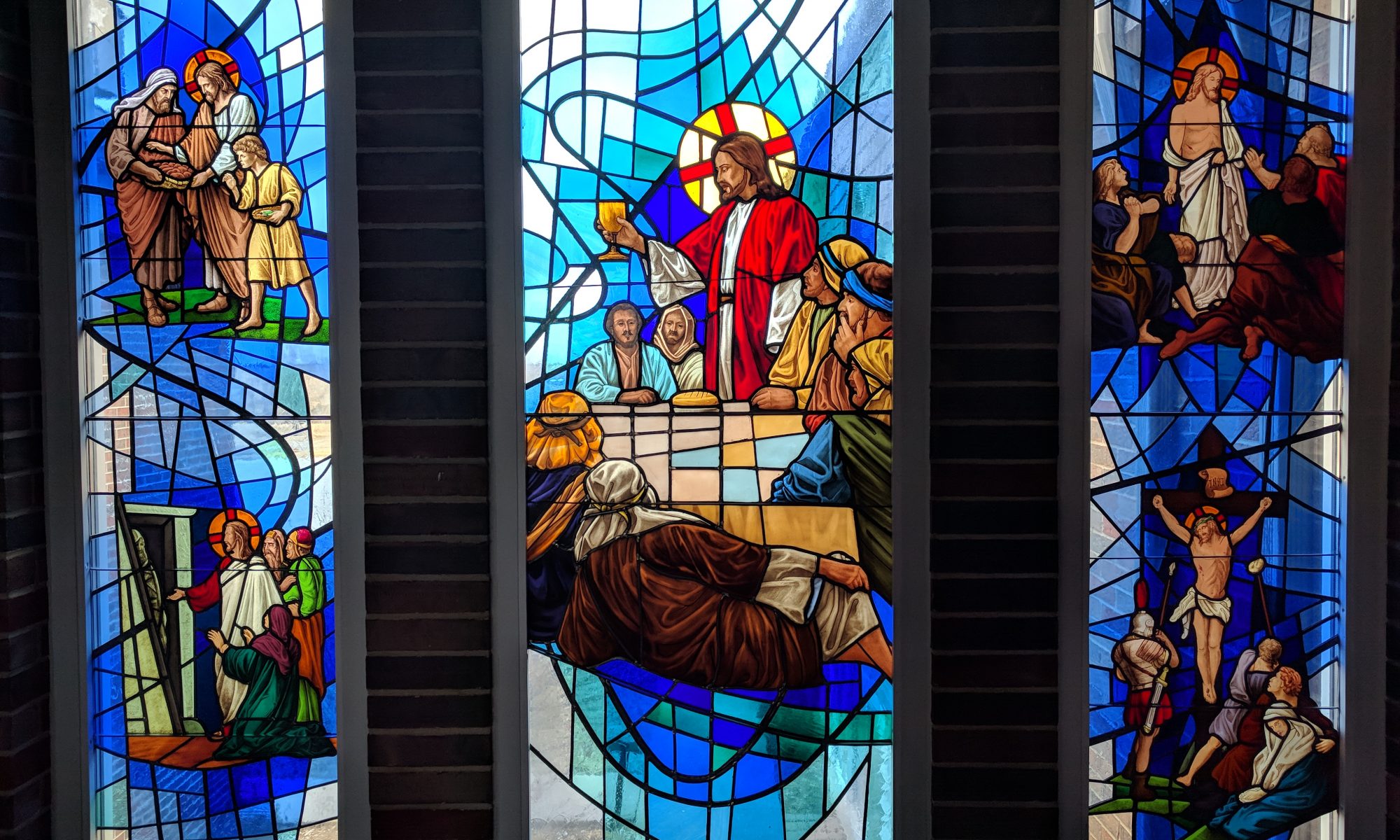
Lessons: Isaiah 55:10-13, 2 Cor. 11:19-12:9, Luke 8:4-15
Hymns: LSB 589, 823, 577, 586, 566, 921
Grace, mercy, and peace to you from God our Father and our Lord and Savior, Jesus Christ. Amen.
Today’s epistle is rather long, and we got a glimpse into the great suffering St. Paul endured as he preached the Gospel on his missionary journeys. To understand why Paul writes about these things, saying he speaks as a fool, it is helpful to know the context. The Apostle Paul had visited the church in Corinth (which is part of modern-day Greece) for about 18 months. Following his visit, it appears that he wrote four letters back to the Corinthians. The only two that have survived are his 2nd and 4th letters, which we call 1 and 2 Corinthians.
Many problems developed in the Corinthian Church and so Paul addressed the matters head on in 1 Corinthians. But then, some accused Paul of being bold when writing, yet weak in person—that he could hide behind bold letters but not say much to them when he spoke to them face to face. Paul called those making these accusations super-apostles (2 Cor. 11:5).
You see, these “super-apostles” thought they were hot stuff and tried to make Paul out as weak or lukewarm. They bragged about themselves and their abilities while putting down Paul. And the Corinthian Church was buying into their lies.
The so-called “super-apostles” claimed Paul was way too authoritarian. So, they tried to come across as nice, flexible, and reasonable people who could resonate better with the congregation. They wouldn’t rock the boat like Paul does. They were the Joel Osteens and Rick Warrens of our day—eloquent and talented; religious yet manipulative, Christian-sounding yet opposed to the pure proclamation of the Word and the right administration of the Sacraments, and bent on their own personal wealth rather than spreading divine truth.
The super-apostles which Paul addressed wanted to get rich off the people. They made up what constituted true apostles and then showed how they met their definition. In their minds, true apostles were those who were eloquent in speech, gave in to the sinful wishes of the people to “keep the peace,” have a clear Hebrew ancestry, and are (as they figured) the true servants of Christ.
So they contrasted their definition of an apostle with St. Paul, who, if you recount, was called to be an apostle directly by Jesus when he was on his way to Damascus. St. Paul was not an eloquent speaker. He did not cater to the sinful desires of the people. He did not grow up in Judah, but instead grew up in Asia Minor. And prior to his conversion to Christianity, he persecuted the Church of God. He persecuted Christians. He persecuted Christ.
Thus, the “super-apostles” thought had a lot on Paul. And the Corinthian congregation was listening to these proud, arrogant liars.
So, Paul sets the record straight. He makes it clear that true Christians and true ministers of the word do not boast in themselves. Paul wrote, “Let the one who boasts, boast in the Lord” (2 Cor. 10:17).
Paul also sets the record straight by showing the people their folly in listening to these false teachers. In verse 20 of our Epistle (2 Cor. 11:20), Paul lists five horrible things these false teachers were doing to the people. First, they were enslaving the people—requiring that salvation not be found in Christ alone, but also in their observance of some Ceremonial Law. Second, the false teachers were simply after their money. Third, they were deceiving the people with their lies. Fourth, they were exalting themselves. And finally, they were being physically abusive to the Corinthian people—and the people put up with it and thought it was all good.
The false teachers were bold in their abuse in the Church. They were bold in turning the people away from Christ. So, Paul responded by saying, “You like those bold men who call themselves apostles? Then let me be bold. Let me show you how much I suffered on account of the Gospel!” And then Paul gives a long list of ways in which he suffered by being a witness of Christ and His deeds.
A true witness of the Gospel does not brag about himself or his abilities, as Paul teaches. If a true witness of the Gospel wishes to brag about anything other than Christ, it ought to be the way in which he suffers on account of being faithful. And even that is unnecessary, as Paul points out.
Paul’s primary point is that these false teachers must be done away with. They can no longer be tolerated. They are hurting the Church because they are not serving as faithful witnesses to Christ. Instead, they are simply being witnesses to themselves.
Paul’s secondary point here is that those who wish to be witnesses—those who declare the life and works of Christ to others—will suffer. Paul suffered immensely. The world is hostile to Christ and His servants. He was deeply concerned for the people. And so, he suffered.
Many people today are worried about the image of the Church before the world around her. They worry about what the world thinks when we only ordain men into the ministry or practice closed communion or uphold six-day creation or that we are saved by grace through faith in Christ Jesus alone or when we agree with both science and Scripture that human life begins at conception or that having XX chromosomes means you’re female and XY chromosomes means you’re male.
Yes, such positions are a laughingstock to the world. As a result, when the Church remains faithful to the Word of God, the world will mock and scorn and jeer and laugh.
Yes, such positions are a laughingstock to the world. As a result, when the Church remains faithful to the Word of God, the world will mock and scorn and jeer and laugh.
So be it.
They did the same thing to the prophets. And to the apostles. And to Christ Himself. And to faithful witnesses today.
But while the world is laughing, the Holy Spirit is working. For the Word of God—as it is scattered (that is, proclaimed with reckless abandon)—will accomplish what God pleases. It will bear fruit and yield a crop a hundredfold. Sinners will be added to Christ’s Church as forgiven children of God, redeemed by the Blood of Christ.
St. Paul preached the Gospel in one place and then moved to another. He established churches and raised up ministers who continued to preach the Gospel even after he left. He sowed the Word. He scattered the seeds in many places. He did not bother to do demographic studies. He did not try to determine who would be the most receptive to the Word. He did not alter doctrine to suit different kinds of people.
Instead, he preached the Word. Some seed fell by the wayside, some fell on rock or among the thorns, and others fell on good ground.
As we witness the Gospel today, we do the same as Paul. We don’t look at our neighbor and say, “Well he did that 40 years ago so I’m not going to bother confessing my faith to him” or “Well that person fell away years ago and it is no point” or “That person has some beef with me or my pastor or my church so that would be a waste of time.” No, we do not do these things at all. We let the seeds fall where they may.
Therefore, we will continue in witnessing the Gospel. And we trust that Christ will make the increase according to His timetable and good pleasure. We witness because of our deep concern for those around us.
Witnessing this faith is not easy. In fact, the Greek word for “witness” is where we get the English word “martyr.” We translate the Greek word “martyr” as a “witness” to the Gospel. But when we say “martyr” in English, we are referring to someone who has severely suffered—died on account of his faith.
Through the centuries those who have been clear witnesses to the Gospel have suffered and often died because of it. Many have been martyred.
That is part of the reason why too many Christians are unwilling to be witnesses of the Gospel. They are afraid. They are afraid of suffering. They are afraid to take up their crosses and follow Jesus.
Often, they are too proud. They are afraid that they may be asked a question that they cannot answer. They are afraid that they don’t know enough of the Gospel and the Christian faith. So they remain silent.
And such silence has been a tool of the devil for centuries. Such silence does not help our neighbor who is dying in his sin. Such silence does not promote the Gospel or Christ or His Church.
Will you break your silence and be His witnesses? Will you recklessly scatter the seed and let it fall where it may? And will you join me in telling the Good News of Jesus Christ to others?
That is part of the work of the Church: to be a witness of Jesus to the world. This work is not simply the work of a pastor; it is also your work. God gave you mouths to speak and hearts to believe. And when you engage in that work, our Lord is well pleased.
Think of it this way. What would you do if you received a billion dollars? Would you use it to help the poor? Give to charity? Donate much of it away to find a cure for cancer or stop domestic violence or something else? Certainly, you wouldn’t keep it all to yourself!
With the Gospel, you have a treasure worth more than a billion dollars. You have the Gospel of Jesus Christ. He bled and died for you on the cross. He has taken your sin away. He rose from the dead, securing your everlasting salvation. That’s a gift money cannot buy.
Now what do you do with this treasure? You spread it about. You give it away. You tell others. You are his witnesses.
That way others can have the same eternal life that is abiding in you. The treasure is yours. And it is for others too! Amen.
The peace of God which passes all understanding keep your hearts and minds in Christ Jesus to life everlasting. Amen

